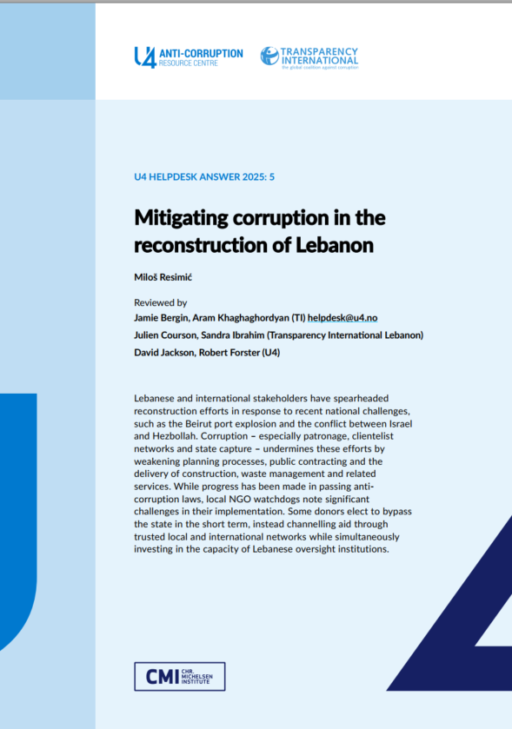
This Anti-Corruption Helpdesk brief was produced in response to a query from a U4 Partner Agency. The U4 Helpdesk is operated by Transparency International in collaboration with the U4 Anti-Corruption Resource Centre based at the Chr. Michelsen Institute.
Query
Please provide an overview of corruption risks in the reconstruction process in Lebanon, the key anti-corruption reforms and mitigation strategies to counter corruption in the reconstruction process.
Summary
Lebanese and international stakeholders have spearheaded reconstruction efforts in response to recent national challenges, such as the Beirut port explosion and the conflict between Israel and Hezbollah. Corruption – especially patronage, clientelist networks and state capture – undermines these efforts by weakening planning processes, public contracting and the delivery of construction, waste management and related services. While progress has been made in passing anti-corruption laws, local NGO watchdogs note significant challenges in their implementation. Some donors elect to bypass the state in the short term, instead channelling aid through trusted local and international networks while simultaneously investing in the capacity of Lebanese oversight institutions.
Main points
- Since 2019, Lebanon has faced a serious economic collapse, political paralysis, the Beirut port explosion and an escalation of the conflict between Israel and Hezbollah, all of which have necessitated significant reconstruction efforts from national and international stakeholders such as the Reform, Recovery and Reconstruction Framework (3RF).
- Lebanon's prevailing political sectarianism has fostered corruption through patronage, clientelist networks and state capture, all of which have the potential to undermine reconstruction efforts, especially in the design and planning phases, public contracting and delivery of related services.
- Despite the adoption of anti-corruption legislation and the establishment of institutions like the national anti-corruption commission (NACC) and the public procurement authority (PPA), implementation remains weak due to insufficient technical and financial capacities, poor levels of compliance with the legislation and resistance from political elites.
- Citing corruption risks and political uncertainty, some international stakeholders have opted to channel reconstruction aid through trusted networks while simultaneously working to strengthen Lebanese oversight institutions.
- International donors’ prior interventions in Lebanon highlight several strategies to mitigate corruption risks and ensure funds reach intended beneficiaries, including conducting comprehensive assessments of emergency needs, due diligence of implementing partners, enhanced transparency and accountability measures such as publishing project related documents on public monitoring platforms, as well as conducting and ensuring independent audits.
Authors
Miloš Resimić
Reviewed by
Jamie Bergin, Aram Khaghaghordyan (TI) [email protected]
Julien Courson, Sandra Ibrahim (Transparency International Lebanon)
David Jackson, Robert Forster (U4)
Date
12/02/2025
Tags
 Download PDF
Download PDF
